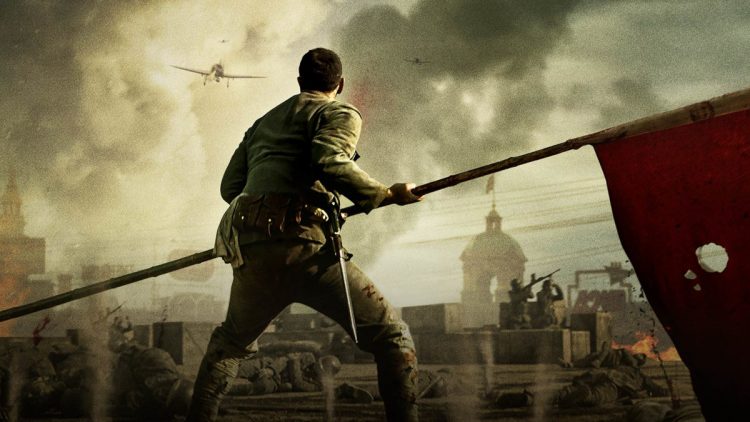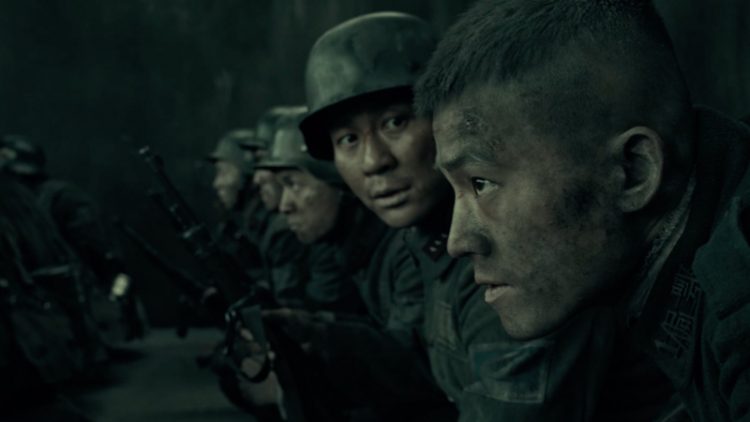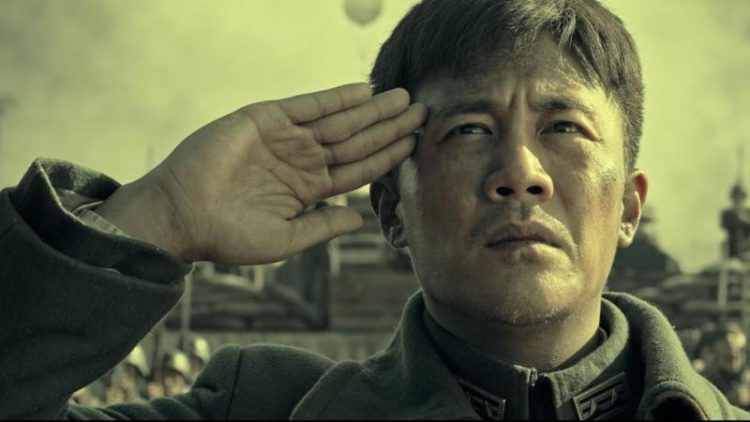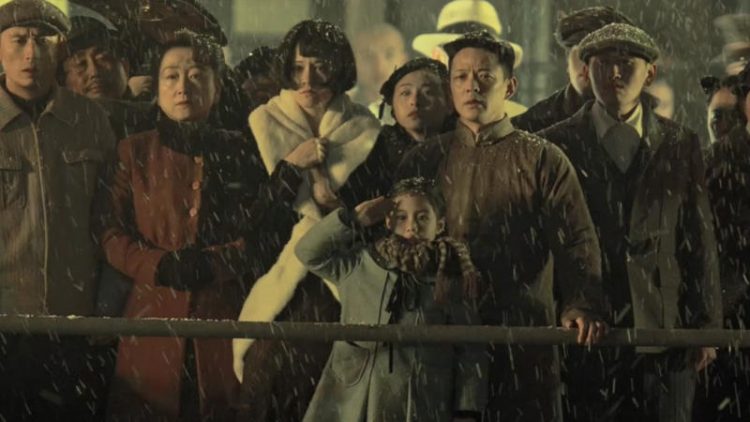
Credit: The Eight Hundred
When Parasite director Bong Joon-Ho declared, “Once you overcome the one-inch tall barrier of subtitles, you will be introduced to so many more amazing films.”, he proved it by sweeping awards at the Academy ceremony. However, even after his remarkable achievement, foreign films are still underrated. The Eight Hundred is no exception. Director Guan Hu planned and prepared this movie for years, resulting in an intimate, brutal war spectacle with exquisite photography and a gripping score. Granted that history recorded the beginning of WWII in 1939, it began in 1937 with the Japanese invasion of China. Guan’s story begins with the Chinese army abandoning a ruined Shanghai, except for one warehouse that is defended by a regiment of about 800 troops. The warehouse was a bank vault. Therefore, it had extra-thick walls. It stands across a narrow river that separates foreign concessions from the battlefield, and crowds hang along the riverside street to watch the ongoing battle as some view from the privilege of their balconies since the Japanese can’t attack the foreign concession due to the diplomatic predicament such actions would cause.

Credit: The Eight Hundred
The slow opening act allows the movie to build a singular coherent storyline while tracking multiple characters.
In a story with too many characters to remember and multiple storylines developing, the main title appearing 20 minutes into the film conveys the director’s understanding of the task he needs to achieve within a finite time frame. Right off the bat, we’re introduced to a brave young Chinese boy and his older brother, draft dodgers and deserters who are looking for every chance to get away from the battle, a fearless officer who makes Captain Miller from Saving Private Ryan look like a West Point cadet and many other characters whose names come in through one year and go out the other. The Japanese soldiers are nameless characters that signify their role as the stereotypical enemy combatants in any war movie, where providing them with any character development lacks purpose. Meanwhile, the Americans in the foreign concession area are more concerned with placing bets on how long the Chinese soldiers can last and recording footage of the battle than they are about the brutal, one-sided war that the invaders are waging. All these storylines require both patience and finesse, attributes that Guan Hu possesses in abundance.

Credit: The Eight Hundred
The bravery, resolve, and fearlessness found in patriotism will always trump hopelessness.
Although The Eight Hundred may be faulted for its shortcoming in creating a sense of brotherhood and camaraderie among the brave Chinese soldiers, it makes up for this in its display of unflinching patriotism in the face of an insurmountable foe where defeat is all but guaranteed. Much like the story of the 300 Spartans that faced the Persians at the Battle of Thermopylae, the 800 Chinese soldiers at the Shanghai warehouse are willing to give their lives to defend their freedom despite knowing that they don’t stand a chance of victory. Similarly to 300, the battle at the warehouse is part of a bigger picture that embodies the metaphor of losing a battle to win a war. No moment exemplifies this point more than the scene on the warehouse rooftop, where the Chinese soldiers are attacked by fighter jets while in a parade to raise the Chinese flag. Despite being shot and gravely wounded, the Chinese soldiers herd together at the base of the flag to keep it erect. The Chinese civilians in the foreign concession area can only stare at a distance, tears streaming down their faces from the moving actions of their fellow citizens giving their lives to push the flag back up. It may seem like a pointless act because, in the very next scene, the fighter jet circles back and opens fire on all the soldiers, killing them indiscriminately as the flag finally falls to the ground. However, this futile act inspires the Chinese at the concession area to rally together and come to the aid of their fellow citizens by providing medicine, food, and additional gear. Chinese or not, you will fall in love with this movie’s passion even though it may approach rather far-fetched lengths to show off that intense love for its country; several authentic, inspirational moments pay homage to it, the 800 soldiers.

Credit: The Eight Hundred
Chinese cinema shows a lot of promise, and The Eight Hundred paves the road for international filmmakers.
Becoming a critical and commercial success that grossed $461 million worldwide in a year when the pandemic forced most people to stay home and avoid going to cinemas, this movie set the bar for other Chinese films and turned the world’s attention to international filmmakers like Guan Hu and many others that have stayed hidden in the shadows of famous Hollywood filmmakers. Granted that Guan Hu is heavy-handed in the message of patriotism and loyalty to the nation, the detail in strategic tactics and arrays of military equipment exhibited provides him with a pass this time. Additionally, his phenomenal work in establishing the contrasting images of the battle in the warehouse and the festivity in the concession area, separated only by a narrow river, is a testament to his competence as a director.
 Follow Us
Follow Us





